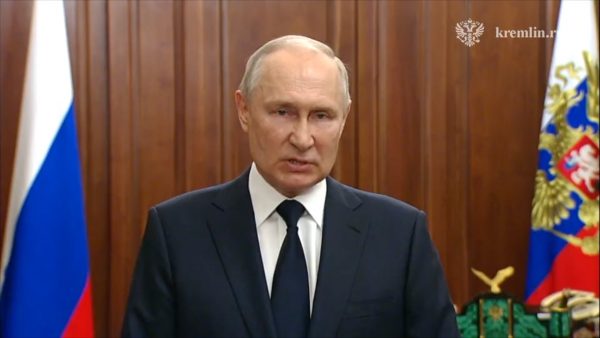But evidence does not support this view. Russia’s Federal Security Service immediately found out about the mutiny, and at 10am on 24 June, Putin made one of his strongest statements ever — rebuking the plotters of the mutiny as ‘traitors’. Partly through the intervention of Alexander Lukashenko, President of Belarus, Prigozhin halted his march in the evening of 24 June and was sent to Belarus.
Kremlin sources explained that Putin made two vital decisions on that day. He decided that ‘Prigozhin has to be neutralised away from the war in Ukraine’, but also that a ‘civil war where Russians kill each other must absolutely be avoided’. The Russian Army received orders to not fire against the mutiny — and that in exceptional cases, they should get a special order to fire back from Russia’s president himself. These dual orders were met. There is no clearer evidence that Putin’s power is still substantial and probably became even stronger after the mutiny.
Still, many uncertainties remain. On 10 July, a Kremlin spokesman revealed that Putin had received Prigozhin and 35 key Wagner members as early as 29 June and held talks over three hours. Prigozhin’s future activities and the fate of Wagner members are unknown, but one might assume that Putin has become confident that the image of reconciliation will help consolidate his domestic power and stability.
At the same time, Russian General Sergey Surovikin, one of the most highly regarded commanders of the Ukraine war and close ally to Prigozhin, was reportedly detained. His whereabouts are also unknown.
If Prigozhin, combined with splinters of Russia’s military forces, attempts another coup against Putin, Russia’s domestic stability may be severely affected. But at this point, evidence suggests a contrary direction.
The Kremlin’s strategy seems to dismiss the Prigozhin affair as a completed scandal and attempts to redirect attention to the Ukrainian counteroffensive, which started on 5 June 2023. Military experts agree that the first month started with the unexpected failure by Ukrainian forces in even mobilising some of their finest tanks, including the Leopard 2. But on 22 June, Ukrainian forces hit the Chongar bridge, which connects Crimea to the Russian mainland, apparently with a Storm Shadow British missile.
While the first month of the counteroffensive did not produce the results Ukraine hoped for, this is just the first step. The final outcome of the counteroffensive is hard to predict.
Amid this uncertainty, NATO held its summit from 11–12 July in Vilnius, Lithuania. This summit may be decisive for the war and the future of European security more broadly. As for weapons, the United States already gave consent to supply F-16 fighter jets to Ukraine at the G7 Hiroshima Summit in May 2023. This time, US President Joe Biden decided to supply cluster bombs to Ukraine. Over 100 countries, including Germany, France and Italy, are party to the Oslo Treaty, which bans these cluster bombs because of the extensive damage they inflict on military personnel and civilians.
But the most important issue for NATO members and President Zelensky, who was invited to the summit, was the issue of Ukraine’s future accession. The Joint Communique dated 11 July acknowledged that ‘Ukraine has moved beyond the need for the Membership Action Plan’ but that ‘an invitation to join the Alliance’ will be given only ‘when Allies agree and conditions are met’.
Zelensky expressed on Twitter his strong dissatisfaction that no timeframe was agreed. But after the first NATO-Ukrainian council on 12 July, the G7 issued a Joint Declaration pledging ‘enduring support’ to Ukraine. On top of this, President Biden made an emotional speech in Vilnius saying, ‘we will not waver’. In response, a Kremlin spokesman has already given the first warning that ‘the security guarantee which the West is trying to give Ukraine is mistaken and dangerous’. Russia may be weighing the impact of increased weapons supply on the battlefield and NATO’s somewhat confused systemic development.
Some warn that second-track exchanges need to be opened between Russia and the United States to prepare for a ceasefire. When thinking of the possibility of a ceasefire in Ukraine, mediating countries could play important roles. As an example, Turkey played an important role in March 2022 negotiations, but relations between Russia and Turkey had become strained by the current Summit.
But there are also two weighty countries in Asia to consider — China and India. China cannot lose Russian support in its Cold War rivalry against the United States. Chinese President Xi Jinping made a visit to Moscow in March 2023 to show Russia’s importance to China. His peace proposal in February may indicate his intention to act when an opportunity emerges.
India has had close relations with Russia for a long time, and recently joined the Shanghai Cooperation Organisation to get closer to both Russia and China. But India is also a member of the Quadrilateral Security Dialogue and is deepening its ties with the United States and its allies.
Much remains up in the air for Russia’s war in Ukraine. NATO is hardening its resolve to support Ukraine, but Putin seems to be determined to ensure a degree of success. China’s and India’s friendly relations with Russia remain driven by self-interest as much as longstanding amities. Prigozhin’s failed mutiny is unlikely to destabilise Putin’s rule, but that may ultimately result in a prolonged war and an increased loss of human lives on both sides.
Kazuhiko Togo is Visiting Professor at the Global Centre for Asian and Regional Research, University of Shizuoka. He was formerly Director General of the Treaties Bureau and European Affairs Bureau at the Ministry of Foreign Affairs, Japan.

